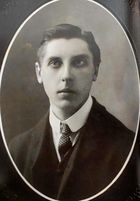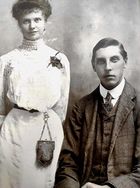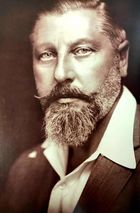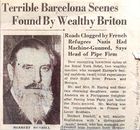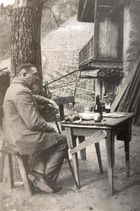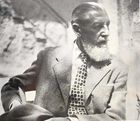Herbert Edward Dunhill
work in progress =)
Born in 1882, brother of Alfred Dunhill. Herbert Edward Dunhill (known as "Uncle Bertie") joined his brother in the business in 1912.
After Alfred, tired of family life, (supposedly) ran off with a fisherman's daughter, his brother, Herbert Edward Dunhill, better known to his family as Uncle Bertie, led the empire.
Here, Mary reports on her book, a bit of her uncle's personality and how he was invited to join the business by his father:
"One of the visitors who occasionally came to Woodlands was Uncle Herbert or Bertie, as we called him, Father’s youngest brother and his junior by twelve years, who was soon to take an important part in the business. He had been a territorial member of the Artists Rifles but, on account of the tubercular condition that was to afflict him for most of his life, he had been declared unfit for active service.
Uncle Bertie, then about thirty years old, was tall, outstandingly handsome and clean-shaven though he was later to grow a full Imperial beard, reddish in color. He was so much more extrovert and forthcoming than Father that their blood relationship would have surprised you. On leaving King’s School, Canterbury, Uncle Bertie had lodged with my parents and, on account of the somewhat foppish ways he affected in his youth, from his wide-brimmed hats to his vegetarian diet, and partly because of the sackfuls of postage stamps he kept under his bed, Mother regarded him as a crank. But Uncle Bertie, as he was soon to show, was astonishingly astute, especially in financial matters. Some members of the business were soon to be daunted by the stern glance his pale eyes could give you from behind their gilt-framed spectacles, though I always felt affection for Uncle Bertie. I also looked forward to his visits because they usually meant that I could spend some time with Lilian, his daughter and my cousin, a pretty fair-haired girl, just about as lively as I was. We were almost exactly the same age and the greatest friends.
Before I was born Uncle Bertie had tried his hand with some sort of a shop in New York, returning with Aunt Violet, the fussy little woman he had married, in time to join Father in his early days at Duke Street an arrangement that the problems with creditors had brought to a rapid close. Uncle Bertie had then opened his own tobacconist’s shop in Harrow where he was now living in a semidetached house in Butlers Avenue and where Aunt Violet ran a hat shop.
The visit I refer to took place on a shimmering day in summer, about the middle of the war, just after Alfred Henry had returned to his regiment for the battle of the Somme. I remember the joy of taking Lilian off to see the sticklebacks in the pond and then of lying on our backs, hidden by long grass, chattering away like magpies through the drowsy afternoon.
We were all in the dining-room that evening when Father looked up from his plate and said with characteristic suddenness, ‘By the way, I’ve just bought another house in London. It’s in Notting Hill Gate. I really can’t go on with these unreliable trains. And the house, incidentally, is complete with a staff.
‘A staff?’ exclaimed Mother. Though she obviously knew about the plan, this point seemed to take her by surprise, never having had more than a local woman to give occasional help. ‘And you had better come and have a look at the new factory, Bertie,’ Father said. ‘Why not sell that shop of yours and join me again? We badly need some office administration.’ ‘Are we leaving here?’ I asked in sudden anguish. ‘Oh no. We’ll keep this place on,’ Father assured us. We’ll need it at weekends and when the boys come home.’
As soon as we were allowed to leave the table Lilian and I ran back into the garden. We had plenty to talk about. It was dusk when Mother called us in. Father and Uncle Bertie were still in the dining-room, bent over papers and plans." Dunhill, Mary, Our Family Business (The Bodley Head - Great Britain, 1979).
Balfour reported that Herbert was involved in the motoring accessories business along with his brother Alfred, but it's not clear when this involvement started but ceased in 1905 after they resigned from the company (Alfred still a prominent shareholder until December 1908, over a year after he had started trading as a tobacconist). For the latter half of 1908, the rates were payable by ‘Dunhill Bros Ltd’, Alfred’s youngest brother Herbert having decided to join him in the business. But the partnership dissolved almost immediately and the company never traded After that. Herbert starts his own business, in north London - were two modest tobacconists’ shops. From the end of 1908 up to 1911, Herbert negotiated tobaccos, but we couldn't find detailed information about this activity and if it had any relation to Alfred's business. He was considered by his family members as an experienced businessman. He takes over the management of Alfred's company in 1912, leaving him to take the creative processes. After Alfred's retirement, he assumes a central role in the administration - position that he occupies until 1950.
After five years Alfred Dunhill was joined by his younger brother, Herbert, who had a powerful business acumen. He looked after the financial side of the business and left Alfred to initiate and develop products. It was a perfect committee of two! The increasing success of the business was achieved more by word of mouth and recommendation than from advertising; virtually none of that was undertaken. Alfred Dunhill retired in 1928 (he lived on until 1959) and the business was run by Herbert until his death in 1950. For many years Herbert lived in Monte Carlo and controlled the day-to-day running by letter, telegram and regular visitors from the London office.Richard Dunhill - Forewords of Balfour, Michael. Alfred Dunhill, One Hundred Years and More (Weidenfield and Nicolson, London, 1992).
Two male members of the staff took turns to travel to Merano, their bags stuffed with reports, accounts, proposed salary increases and requests that required his signature before they could be implemented. Every week he sent back bags of memorandums and instructions, no detail being too trivial for his critical eye, even the way stamps should be stuck onto office envelopes and the space that should be left between them if they happened not to be of the same colour. If this reluctance to delegate authority seems petty in a man whose health had now banished him from the country - and we naturally found it extremely frustrating - Uncle Bertie’s methods, as we shall see, ensured that the family continued to exercise a tight control over the London business throughout his lifetime.Dunhill, Mary, Our Family Business (The Bodley Head - Great Britain, 1979).
Mr. Richard Dunhill also relate this: "as an example of Herbert’s passionate attention to detail, I reproduce the following memorandum, dated 16 September 1945, from Herbert Dunhill to the chairman, Alfred H. Dunhill. It goes without saying that Herbert was a philatelist par excellence:"
Re: Stamping of Letters Since I last wrote about the stamping of our overseas letters, the carelessness in stamping has not however lessened. It has become worse and more consistently bad. My rules in past years were that stamps must be level and at least a quarter-inch from the edge, the same distance top and sides. If the stamps were of different colours they should have a slight space between them; if the same they should be placed so that they appear to be from one sheet, even if really not. Care should be taken, if several stamps are used, to choose stamps of colours that look pleasant when placed together. Please have my methods carried out in the future.
Herbert E. Dunhill.
He became more and more out of touch with modern commercial practice in England, and when he died, the directors, particularly my uncle Alfred Henry Dunhill and my Aunt Mary, were soon able to make changes to improve the running of the company.Richard Dunhill - Forewords of Balfour, Michael. Alfred Dunhill, One Hundred Years and More (Weidenfield and Nicolson, London, 1992).
